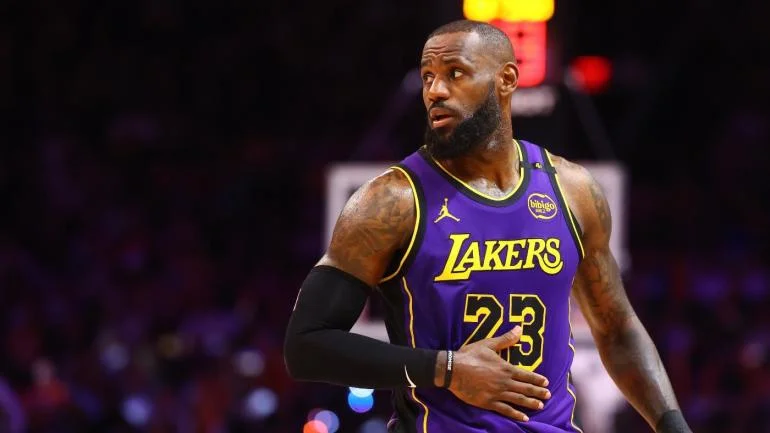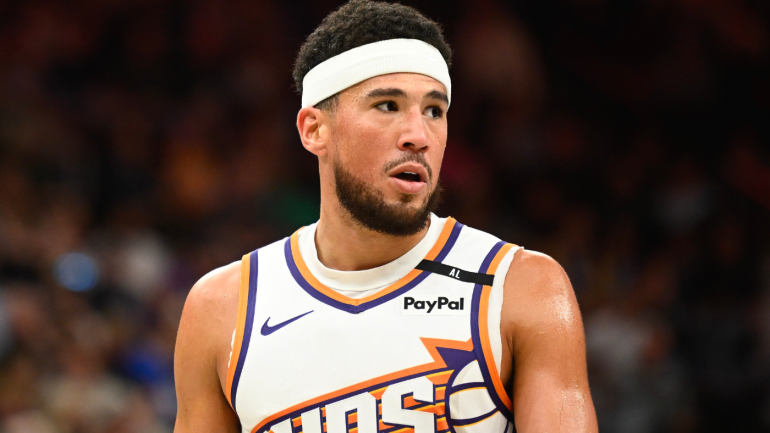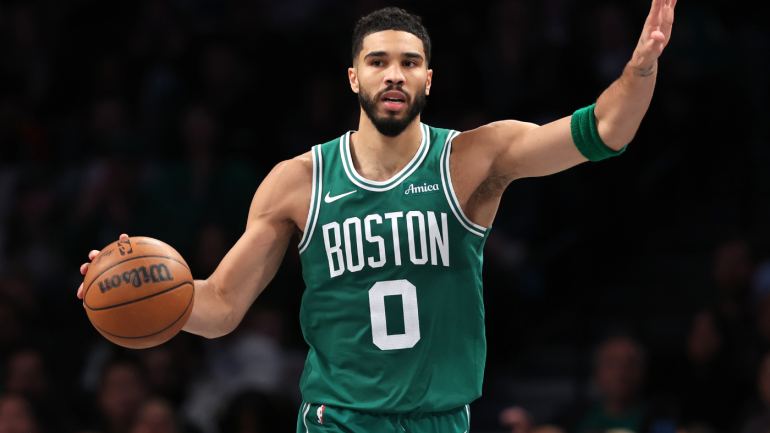In this photo taken March 25, 2016, Washington Wizards guard John Wall (2) and Washington Wizards guard Bradley Beal (3) stand on the court during an NBA basketball game against the Minnesota Timberwolves, in Washington. With only one ball on the court at any given time, Wall and Beal know they have to share it. Wall and Beal have to share the ball on last-second shots and the limelight in the backcourt as the Washington Wizards are trying to get back to the playoffs. Wall is healthy again after having surgery on each knee, and Beal is fresh off signing a $128 million, five-year contract that ranked among the richest in the NBA this offseason. (AP Photo/Alex Brandon) ORG XMIT: WX111
The Conference Finals are finally here and we should all be soaking up every minute of that. However, the majority of the league has already entered their offseason, so we’re going to continue to show them some love as well. We’ve already studied the 14 lottery teams and the 8 teams that got sent packing in R1.
Today, we’re going to finish up the last of our R2 losers with the recently eliminated:
WASHINGTON WIZARDS
The Washington Wizards could be long-term contenders in the East.
Everybody knows that King LeBron James still rules the East, but there’s a fascinating rivalry developing between the best of the rest. Boston vs. Washington — and Isaiah Thomas vs. John Wall, specifically.
The point guards are arguably the second best players in the East and get to battle against each other at the same position. Of course, it’s not surprising that the two struggle to guard each other during those matchups. After all, Wall’s a big point guard at 6’4″, while Thomas is famously only 5’9″ (if that.) That’s a 7-inch difference. Think about that. We wouldn’t be surprised if a 6’4″ guard struggled to guard a 6’11” big, or that 6’11” big struggled to stay in front of a 6’4″ guard — so why are we surprised that these two give each other fits?
I also love the budding rivalry because of the differences in their journeys to get to this point. Thomas has been overlooked and underestimated his whole career — barely getting drafted, and getting dumped by two different teams before he finally broke out as an MVP candidate this year. There’s no wonder why he plays with a chip on his shoulder. He’s been told he’s not good enough his whole life.
Meanwhile, John Wall’s had almost the opposite path. He’s been destined to be an All-Star since high school, where he was the #1 prospect in his class, played on a stacked Kentucky squad, and went on to become the #1 pick as well. It’s no wonder he plays with swagger. He’s been told he’s the best his whole life.
I don’t know if the Celtics or Wizards will ever have enough juice to beat LeBron and the Cavs for a while, but they should continue to battle against each other on an even playing field for the next several years. In a playoffs filled with blowouts that may be headed for a GS/CLE showdown, it’s a wonderful undercard for us to enjoy.
Let’s focus on the Wizards now, and try to figure out how they may be able to take that next step forward.
(1) (Over)pay Porter
Even Wizards fans are bristling at the notion that Otto Porter (a restricted free agent) could be cashing checks amounting to $20 million a year this summer. He’s not a great player. He’s not a top 20 player. Heck, he may not even be a top 30 player. Why does he deserve a max or near-max?
Personally, I’d ignore that noise and pony up for a Porter extension anyway. Porter may benefit from John Wall’s penetration and passing, but at the end of the day — he delivers on those opportunities. He may not be a great player on his own, but he plays great in this particular system and with this particular team. In fact, Porter had fewer turnovers per game this year (0.4) than he did steals (1.5), threes (1.9), and even blocks (0.5).
When you consider a long-term extension for a player, you have to consider how good they are now, but also how good they will be in the future. Right now, there’s no reason to suspect that Porter will start to decline. He’s only 23 years old, so his next extension will be over before he reaches the age of 30.
Porter’s also shown the ability to improve, dating back to his college days. As a freshman at Georgetown, Porter came off the bench as a promising player but a non-shooter — he only hit 0.4 threes a game (at a 22.6% clip). By his sophomore year, he had bumped that up to 42.2%. He’s had almost the same path in the NBA, improving his three-point percentage every year from 19.0% to 33.7%, to 36.7%, to 43.4% this past season. We all know what that means — he’s going to be shooting 70% soon! Okay, not really. Chances are, that 43% will regress some. But the point is: Porter’s continued to make strides to improve his game, which makes me optimistic about his chances of sustaining his success, if not taking another leap forward altogether.
It’s almost a certainty that Porter will be overpaid by his next contract. Because he’s a restricted free agent, a young team with cap room (like the Nets) can bowl him over with a max offer. If I ran the Wizards, I’d try to get ahead of that and work out an extension with Porter before he signs an offer sheet. From what I glean about Porter, he seems like a low-key, team-oriented player. Perhaps he doesn’t want to hamstring his franchise with a massive contract. Maybe he’d be amenable to a little bit of a hometown discount and something in line with a 5 year, $100 million deal (understanding that Wall and Bradley Beal are the true stars of the team.) Money talks, of course, but I have to think the idea of staying with a contender in D.C. (where he went to college) is more appealing than going to a rebuilding Brooklyn team where you won’t find half as many open threes.
(2) Cobble together a bench
The Wizards didn’t lose Game 7 at Boston because they were on the road, or because the Celtics “wanted it more.” They lost because of the same Achilles heel that plagued them all year long – their bench. More than anything else, the team’s biggest problem is their lack of depth. Their starting lineup is among the best in the league, but they have a tendency to blow leads as soon as their starters sub out. Last night in Game 7, John Wall and Bradley Beal looked gassed as they had to carry the load for a combined 90 minutes. They should hang a sign outside the Verizon Center: help wanted.
Ian Mahinmi, their big acquisition last summer, was absolutely overpriced at $16 million a year. However, he’s a good backup center in this league and should be closer to 100% next season. 3rd stringer Jason Smith is still on the books as well; you may not like his contract either ($5 million), but he’s a solid reserve. All in all, a healthy Gortat-Mahinmi-Smith combination makes me feel good about the center position and its depth. Okay great — we’re 1/5th of the way there.
Unfortunately, the bench is a mess basically everywhere else.
The big midseason acquisition — Bojan Bogdanovic — is a restricted free agent who may be hard to retain. I can see an argument that the Wizards should let Porter go and keep Bogdanovic for the cheaper price, but I don’t agree with that. While Porter has proven to be a solid 3-and-D player, his backups Bogdanovic and Kelly Oubre can only do one of the two right now. Bogdanovic is a shooter who still struggles mightily on D (where ESPN real plus/minus rated him as a -3.21). Oubre projects as a great 3-and-D guy down the road, but there’s no telling how long that road will be — he shot less than 30% from three this season. Given that, I’d keep Porter (as mentioned) but let Bogdanovic go if he’s going to get a fat offer somewhere else.
No question, losing Bogdanovic would be a blow to an already weak bench. The team doesn’t have much cap space to replace him on the open market and doesn’t own their own first round pick, either. To replenish this bench, they’re going to have to go bargain shopping. Let’s take a look at each position and some possible FA fits.
Backup PG has long been a problem for the Wizards. I’m surprised by how poorly Trey Burke played his entire NBA career, although less surprised that Brandon Jennings continued to look erratic. I’d consider players like Shelvin Mack and Sergio Rodriguez to fill that game. Neither played well this year, but they’re steadier and headier veterans than Jennings who won’t lose control of the pace of a game. If healthy, Shaun Livingston would be a fascinating fit on this Wizards team as well; his versatility would allow him to play some PG, SG, and even SF at times.
As far as pure shooters go, I’d recommend the team look into cheap veterans, Jodie Meeks and Anthony Morrow. Both would be offense-only help, but the idea is that they can give Bradley Beal a breather now and then to help keep him fresh and healthy. Current Wiz Tomas Satoransky has size for the position, but I’ve never been particularly impressed with him so far.
I expect their other young wing Kelly Oubre to have a brighter future and continue to take a larger role with this team. Still, I’d try to add an additional SF-PF hybrid who can soak up some excess minutes at SF but mainly play a stretch PF role. Omri Casspi is my favorite free agent who fits that profile, while Matt Barnes and even Luke Babbitt would be decent bargain basement versions as well.
Although the team doesn’t have cap room (especially if they do re-sign Porter), they do have an appealing situation here. Suns SF Jared Dudley (who may be worth exploring a trade for himself) publicly asserted that he owes his new contract to John Wall, and other players may feel the same. He’s not exactly LeBron James yet, but a player of Wall’s talent (and playing style) draws in veterans on cheaper contracts than they may get elsewhere, knowing that he’ll make them look better as a result.
Will a bench unit of Shaun Livingston, Jodie Meeks, Kelly Oubre, Omri Casspi and Ian Mahinmi strike fear into the hearts of opponents? No. But the goal is to cobble together a decent and deep enough bench that Scottie Brooks will be able to trust come playoff time.
(3) Manage your stars’ minutes
John Wall and Bradley Beal may be the best young backcourt in the league. Only 26 and 23, respectively, they averaged a matching 23.1 points per game, with Wall adding in a remarkable 10.7 assists for good measure. Thanks to their playoff run, the two have jumped into a bigger national spotlight and may start earning more attention and honors next year.
Specifically, I can see a scenario where John Wall charges hard (a la Russell Westbrook) for his own MVP-caliber campaign. I can see a scenario where Bradley Beal works overtime early in the season to ensure his All-Star appearance. I can see a scenario where the Wizards fight tooth and nail for every win, in an attempt to a top 3 seed and more homecourt advantage.
Those all may be nice goals, but should NOT be the priority. In fact, I’d try to sit down with Wall and Beal before the season and try to manage their expectations and most importantly — manage their minutes for next year. This season, Wall played 78 games at 36.4 minutes per, and Beal (always an injury risk) played 34.9 over 77 games. It’s wonderful that they each stayed healthy, but that can’t be assured if they start to get overworked. Right now, the Wizards are dangerously reliant on those two young stars – a single injury may be a disaster.
I’d try to keep them both under 35 minutes a game, and possibly make them a healthy scratch in some back to backs. That may result in an extra loss here or there, but this isn’t a team that should be scrounging to make the playoffs – they should safely be in the mix. Extra rest for their stars may also help their bench develop as well – with the ultimate goal of getting young Kelly Oubre (who only played 20 minutes a game this year) to a point where you can essentially view him as a 6th starter.
Regardless of MVP or All-Star honors, and regardless of their playoff seed, the Wizards should look at the next regular season as a success if Weal and Beal enter the playoffs at 100%. With a little more balanced of a bench, they may make an even deeper run next time.




